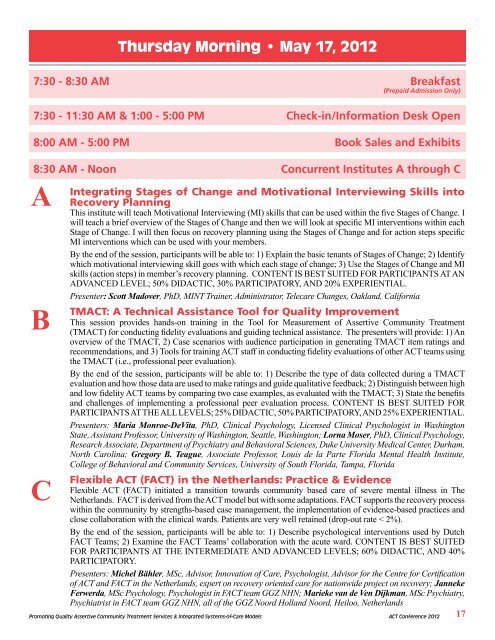2012 ACT Conference Brochure Online - Assertive Community ...
2012 ACT Conference Brochure Online - Assertive Community ...
2012 ACT Conference Brochure Online - Assertive Community ...
Create successful ePaper yourself
Turn your PDF publications into a flip-book with our unique Google optimized e-Paper software.
7:30 - 8:30 AM Breakfast<br />
(Prepaid Admission Only)<br />
7:30 - 11:30 AM & 1:00 - 5:00 PM Check-in/Information Desk Open<br />
8:00 AM - 5:00 PM Book Sales and Exhibits<br />
8:30 AM - Noon Concurrent Institutes A through C<br />
A<br />
B<br />
C<br />
Thursday Morning • May 17, <strong>2012</strong><br />
Integrating Stages of Change and Motivational Interviewing Skills into<br />
Recovery Planning<br />
This institute will teach Motivational Interviewing (MI) skills that can be used within the five Stages of Change. I<br />
will teach a brief overview of the Stages of Change and then we will look at specific MI interventions within each<br />
Stage of Change. I will then focus on recovery planning using the Stages of Change and for action steps specific<br />
MI interventions which can be used with your members.<br />
By the end of the session, participants will be able to: 1) Explain the basic tenants of Stages of Change; 2) Identify<br />
which motivational interviewing skill goes with which each stage of change; 3) Use the Stages of Change and MI<br />
skills (action steps) in member’s recovery planning. CONTENT IS BEST SUITED FOR PARTICIPANTS AT AN<br />
ADVANCED LEVEL; 50% DID<strong>ACT</strong>IC, 30% PARTICIPATORY, AND 20% EXPERIENTIAL.<br />
Presenter: Scott Madover, PhD, MINT Trainer, Administrator, Telecare Changes, Oakland, California<br />
TM<strong>ACT</strong>: A Technical Assistance Tool for Quality Improvement<br />
This session provides hands-on training in the Tool for Measurement of <strong>Assertive</strong> <strong>Community</strong> Treatment<br />
(TM<strong>ACT</strong>) for conducting fidelity evaluations and guiding technical assistance. The presenters will provide: 1) An<br />
overview of the TM<strong>ACT</strong>, 2) Case scenarios with audience participation in generating TM<strong>ACT</strong> item ratings and<br />
recommendations, and 3) Tools for training <strong>ACT</strong> staff in conducting fidelity evaluations of other <strong>ACT</strong> teams using<br />
the TM<strong>ACT</strong> (i.e., professional peer evaluation).<br />
By the end of the session, participants will be able to: 1) Describe the type of data collected during a TM<strong>ACT</strong><br />
evaluation and how those data are used to make ratings and guide qualitative feedback; 2) Distinguish between high<br />
and low fidelity <strong>ACT</strong> teams by comparing two case examples, as evaluated with the TM<strong>ACT</strong>; 3) State the benefits<br />
and challenges of implementing a professional peer evaluation process. CONTENT IS BEST SUITED FOR<br />
PARTICIPANTS AT THE ALL LEVELS; 25% DID<strong>ACT</strong>IC, 50% PARTICIPATORY, AND 25% EXPERIENTIAL.<br />
Presenters: Maria Monroe-DeVita, PhD, Clinical Psychology, Licensed Clinical Psychologist in Washington<br />
State, Assistant Professor, University of Washington, Seattle, Washington; Lorna Moser, PhD, Clinical Psychology,<br />
Research Associate, Department of Psychiatry and Behavioral Sciences, Duke University Medical Center, Durham,<br />
North Carolina; Gregory B. Teague, Associate Professor, Louis de la Parte Florida Mental Health Institute,<br />
College of Behavioral and <strong>Community</strong> Services, University of South Florida, Tampa, Florida<br />
Flexible <strong>ACT</strong> (F<strong>ACT</strong>) in the Netherlands: Practice & Evidence<br />
Flexible <strong>ACT</strong> (F<strong>ACT</strong>) initiated a transition towards community based care of severe mental illness in The<br />
Netherlands. F<strong>ACT</strong> is derived from the <strong>ACT</strong> model but with some adaptations. F<strong>ACT</strong> supports the recovery process<br />
within the community by strengths-based case management, the implementation of evidence-based practices and<br />
close collaboration with the clinical wards. Patients are very well retained (drop-out rate < 2%).<br />
By the end of the session, participants will be able to: 1) Describe psychological interventions used by Dutch<br />
F<strong>ACT</strong> Teams; 2) Examine the F<strong>ACT</strong> Teams’ collaboration with the acute ward. CONTENT IS BEST SUITED<br />
FOR PARTICIPANTS AT THE INTERMEDIATE AND ADVANCED LEVELS; 60% DID<strong>ACT</strong>IC, AND 40%<br />
PARTICIPATORY.<br />
Presenters: Michel Bähler, MSc, Advisor, Innovation of Care, Psychologist, Advisor for the Centre for Certification<br />
of <strong>ACT</strong> and F<strong>ACT</strong> in the Netherlands, expert on recovery oriented care for nationwide project on recovery; Janneke<br />
Ferwerda, MSc Psychology, Psychologist in F<strong>ACT</strong> team GGZ NHN; Marieke van de Ven Dijkman, MSc Psychiatry,<br />
Psychiatrist in F<strong>ACT</strong> team GGZ NHN, all of the GGZ Noord Holland Noord, Heiloo, Netherlands<br />
Promoting Quality <strong>Assertive</strong> <strong>Community</strong> Treatment Services & Integrated Systems-of-Care Models <strong>ACT</strong> <strong>Conference</strong> <strong>2012</strong> 17




